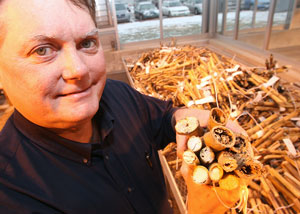 An increase in taxes on biodiesel in Germany is expected to decrease that country’s production of the green fuel. But since Germans’ appetites for biodiesel are unlikely to be lessened, an American company sees the tax hike as a chance to move into the large European market.
An increase in taxes on biodiesel in Germany is expected to decrease that country’s production of the green fuel. But since Germans’ appetites for biodiesel are unlikely to be lessened, an American company sees the tax hike as a chance to move into the large European market.
This press release from Global Earth Energy, Inc. says there’s opportunities in the feedstock and actual biodiesel sales:
Global Earth Energy, Inc. anticipates the opportunity to export the biodiesel produced at their chemical plant in Leland, NC. Due to the increase in taxes on biodiesel in Germany, there has been a decrease in the production of the alternative energy fuel. With the decline of sales and production overseas, there is an excess amount of feedstock, the raw material used to produce biodiesel. Feedstock is the largest cost in manufacturing the fuel source but Global now has the option to buy the feedstock at a discounted price from German sources. The slowdown could also expand Global’s growing market of alternative green energy to Europe.
Now if Global Earth Energy sees opportunity in this, wouldn’t that mean there’s opportunity for other American biodiesel makers? I would think so. We’ll keep our eye on this to see what happens. Stay tuned!


 Got a reminder in my e-mail today about the upcoming National Biodiesel Conference & Expo, Feb. 1-4, 2009, in San Francisco.
Got a reminder in my e-mail today about the upcoming National Biodiesel Conference & Expo, Feb. 1-4, 2009, in San Francisco. GreenShift Corporation has announced it has received a $38 million investment to produce 20 million gallons per year of biodiesel from corn oil, squeezed from the corn used in ethanol plants.
GreenShift Corporation has announced it has received a $38 million investment to produce 20 million gallons per year of biodiesel from corn oil, squeezed from the corn used in ethanol plants. Looking to make a cleaner world and give better mileage to its customers, Freightliner Custom Chassis Corporation (FCCC) has introduced the first hybrid-electric Class A motorhome chassis in the industry.
Looking to make a cleaner world and give better mileage to its customers, Freightliner Custom Chassis Corporation (FCCC) has introduced the first hybrid-electric Class A motorhome chassis in the industry.  The National Biodiesel Board continues to like what it sees when it comes to the incoming Obama Administration.
The National Biodiesel Board continues to like what it sees when it comes to the incoming Obama Administration.

 According to a statement from RFA, “Some have misconstrued this communication as a request for federal assistance or a bailout. To the contrary, the RFA recognizes that by stimulating increased production, innovation, and investment in new technologies and cellulosic feedstocks, a revitalized renewable fuels industry can help bail out the flagging US economy and lessen America’s dependence on foreign oil.”
According to a statement from RFA, “Some have misconstrued this communication as a request for federal assistance or a bailout. To the contrary, the RFA recognizes that by stimulating increased production, innovation, and investment in new technologies and cellulosic feedstocks, a revitalized renewable fuels industry can help bail out the flagging US economy and lessen America’s dependence on foreign oil.”